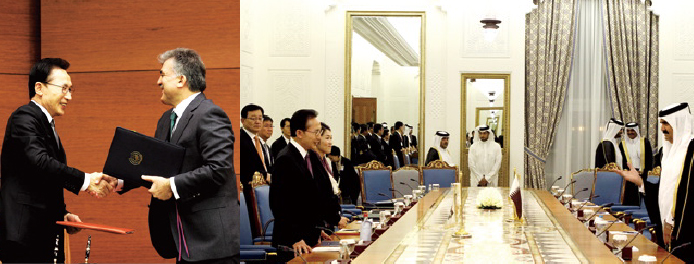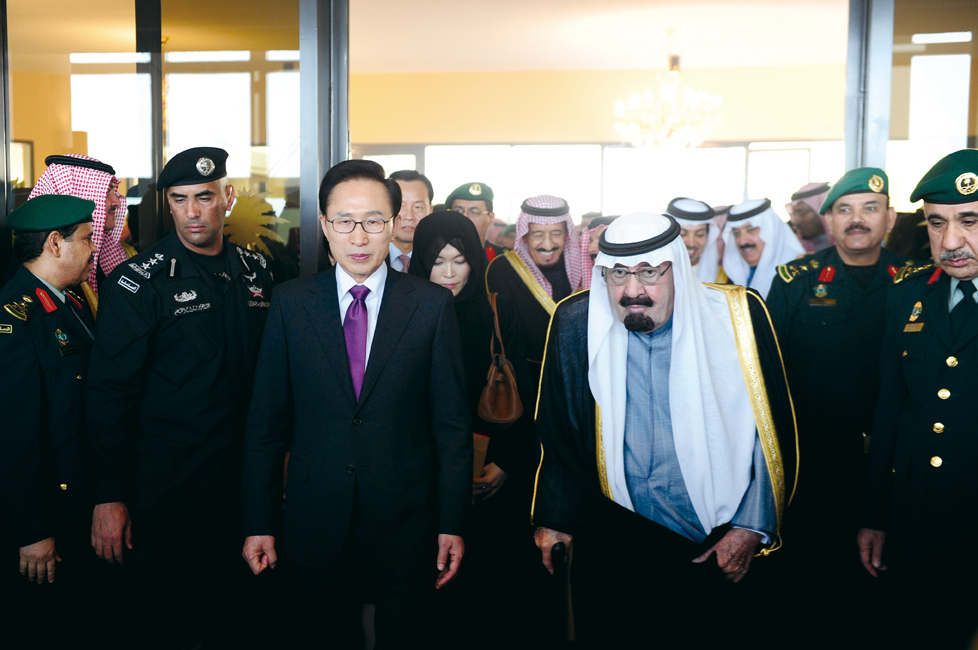President Lee's Successful Oil Diplomacy
Chief Executive makes swing through Middle East and Turkey to strengthen ties and secure oil supplies


President Lee Myung-bak's four-nation trip to Turkey, Saudi Arabia, Qatar, and the United Arab Emirates led to the signing of a bilateral strategic partnership pact with Turkey and the fostering of a future-oriented relationship with the Middle-Eastern countries.
President Lee's from Feb. 4-7 trip was the first state visit of a Korean president to Turkey since April 2005 when ex-President Roh Moon-hyun visited the country.
President Lee and Turkish President Abdullah Gul agreed to upgrade the level of cooperation between the two countries to a strategic partnership during their talks on Feb. 6. The two countries have already been maintaining solid ties based on the brotherhood forged during the Korean War in which Turkey sent soldiers to Korea under the United Nations' flag.
At a joint press conference following their talks, the two presidents reaffirmed their shared determination to further cement bilateral ties. They noted that the two nations aim to conclude a deal on a free trade agreement within the first half of this year, to further reinforce economic, trade, and personnel exchanges between the two countries.
Regarding Korea's participation in atomic power plant construction projects in Turkey, President Lee stressed Korea's willingness to actively cooperate, responding to a strong request from the Turkish government, urging for a resumption of negotiations.
Ahead of the summit talks with the Turkish president, President Lee met with Turkish Prime Minister Recep Tayyip Erdogan on Feb. 5 and exchanged in-depth views on a wide range of bilateral issues, furthering strengthening their friendship since they last met at the Cannes G-20 Summit last November. Lee and Turkish Prime Minister Erdogan agreed on concluding ongoing negotiations on the FTA by June, and to resume stalled talks on a project to construct two nuclear power units on Turkey's Black Sea coast. The talks on the nuclear power plant project between the two countries have been suspended since 2010 because of a failure in narrowing out differences on such factors as electricity prices and government payment guarantees.
While staying in Saudi Arabia, President Lee held talks with Ali al-Naimi, Minister of Saudi Arabia's Petroleum and Mineral Resources, and pledged for continued support from the world's largest oil-rich nation in the stabilization of the international oil market. The Saudi minister responded that the country will strongly consider providing additional resources to Korea in case Seoul cuts down on imports from Iran in line with U.S. sanctions.
President Lee also met with Salman Bin Abdul-Aziz Al Saud, Saudi Arabia's Minister of Defense, and touched on state and international affairs along with ways of enhancing bilateral cooperation for defense.
On Feb. 8, President Lee held a summit with King Abdullah bin Abdul-Aziz Al Saud of Saudi Arabia. During their talks, held on the grounds of the Jandriyah Festival, President Lee extended his gratitude for Korea's invitation as guest-of-honor country at this year's festival.
Marking the 50th anniversary of diplomatic ties between the two countries, the two leaders agreed to further develop the friendship as well as cooperate in a wide range of sectors, including healthcare, national defense, and IT.
President Lee also attended the Korea-Saudi Arabia Business Forum the same day and encouraged the businessmen of the two countries, stressing reinforced ties, particularly in the energy sector.
On the sidelines of Lee's visit, Korean and Saudi officials held talks on Korea's possible participation in a pilot project to construct 10,000 homes in the Middle Eastern nation. Saudi Housing Minister Shuwaish bin Saud Al-Dhuwaihi agreed to make a trip to Seoul at the earliest possible date to discuss the matter.
During his two-day visit in Qatar, President Lee, joined by First Lady Kim Yoon-ok, attended an official dinner on Feb. 9 at Qatar Palace, hosted by Emir Sheikh Hamad bin Khalifa Al Thani. The two leaders remarked that President Lee's visit was establishing a foothold for enhanced cooperation in the natural gas sector and agreed to further expand the scope of cooperation into construction, medical and health care, education, green growth, and climate change.
Delivering a keynote address at the Korea-Qatar Business Forum, President Lee stressed the need to further expand the scope of bilateral ties beyond the energy and resource sectors. President Lee spoke of the green growth sector as one of the promising paths to lead the next phase of bilateral relations, combined with Korea's expertise on green growth as a national vision since 2008 and Qatar's hosting of the next major UN Climate Change Conference this year.
In the United Arab Emirates, the last lap of the tour, President Lee met with Abu Dhabi's Crown Prince Sheikh Mohammed bin Zayed Al Nahyan on Feb. 10, concluding his week-long diplomatic move to secure and diversify oil import resources. President Lee's trip to Abu Dhabi, the capital of the first Gulf nation to sign a strategic partnership agreement with Korea in 2009, was his third during his presidential term.
President Lee extended his gratitude to the Crown Prince of Abu Dhabi for his positive response to the request for additional oil supply during Korean Prime Minister Kim Hwang-sik's visit to the UAE last January. The prince promised his country's continued support in producing a concrete assessment of Korea's needs. nw
(left) President Lee Myung-bak shakes hands with Turkish President Abdullah Gul after signing a bilateral strategic partnership pact with Turkey on Feb. 6.
President Lee Myung-bak and Qatar Emir Sheikh Hamad bin Khalifa Al Thani hold a Korea-Qatar extended summit meeting on Feb. 9.
President Lee Myung-bak attends Saudi Arabia's Janadriyah National Festival for Heritage and Culture in which Korea was invited as guest-of-honor country on Feb. 8. Lee held a summit with King Abdullah bin Abdul-Aziz Al Saud of Saudi Arabia there.
3Fl, 292-47, Shindang 6-dong, Chung-gu, Seoul, Korea 100-456
Tel : 82-2-2235-6114 / Fax : 82-2-2235-0799